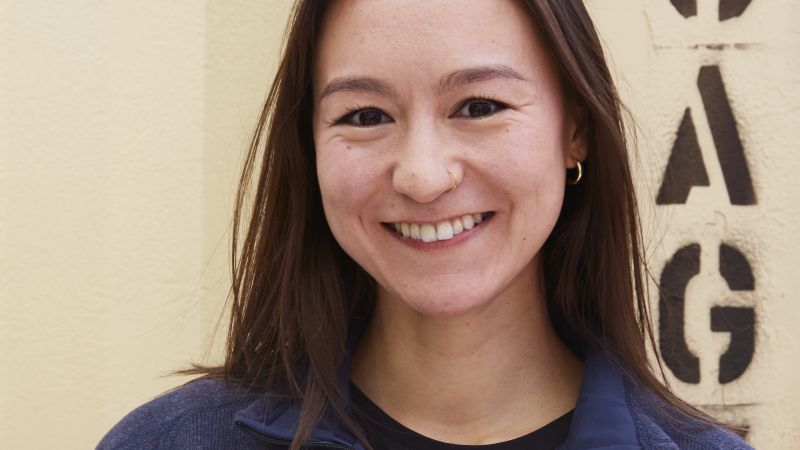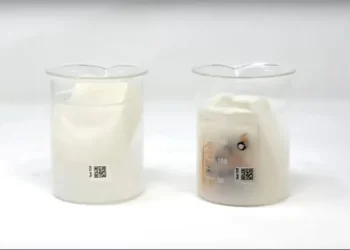Young CEO Aims to Revolutionize Carbon Capture for Ships
Alisha Fredriksson, the CEO of Seabound, is driven by one core mission: to tackle the climate crisis and make a significant impact on reducing global emissions. Seabound, a UK-based climate tech startup, is developing an innovative onboard carbon capture device specifically designed for cargo ships.
The Shipping Industry’s Challenge to Decarbonize
Global shipping contributes about 3% of total greenhouse gas emissions and is working toward achieving net-zero emissions by 2050. However, Fredriksson believes the industry is moving too slowly in reaching that target. “I’m an impatient person,” she says, expressing frustration with the pace of decarbonization in the sector. Seabound’s technology could provide a key solution.
The company’s onboard carbon capture system, which fits into standard shipping containers, works by taking exhaust gases from the engines and running the carbon dioxide (CO2) through a natural process that has been occurring in the oceans for millions of years. The device contains calcium oxide pebbles, or lime, that absorb CO2 from the exhaust. “It’s like a box of rocks,” Fredriksson explains. As the exhaust gases pass through the container, the CO2 is absorbed and transformed into limestone, while the remaining gases are released.
Simplifying Carbon Capture for Ships
Unlike some other carbon capture technologies, Seabound’s system doesn’t separate or compress the CO2 onboard, as those processes are energy-intensive and complex. Instead, the captured CO2 is stored in the pebbles and offloaded when the ship docks at port. The pebbles are then taken to specialized plants where the CO2 can be extracted for reuse or even recycled as construction material.
Seabound has tested its technology, successfully capturing 80% of the carbon emissions and 90% of the sulfur from exhaust gases, which is a significant improvement compared to other methods already in use by about 5% of the global merchant fleet. The company is now in talks with shipping companies and plans to launch commercially by the end of 2025.
A Simple Retrofit for Ships
Fredriksson, who co-founded Seabound in 2021 with Roujia Wen, has a background that includes launching a climate program for a global nonprofit and founding a maritime green fuel startup called Liquid Wind. She was named to Forbes’ 30 Under 30 Europe list and MIT Tech Review’s Innovators Under 35 list in 2023.
Seabound’s system offers several advantages. It doesn’t require additional fuel or energy, as the process generates its own heat. The space occupied by the carbon capture device depends on the size of the ship, but Fredriksson says it’s designed to use no more than 1% of the cargo capacity. The installation is simple, requiring only piping to connect the Seabound container to the ship’s engine exhaust system.
Once the ship reaches port, the pebbles are swapped for new ones, and the captured CO2 is processed to make it ready for reuse or further treatment, such as turning it into chemicals, fuels, or storing it underground. Alternatively, the pebbles can be used as limestone for concrete or road construction, although their quality may be affected by exposure to exhaust impurities.
Pilot Project and Growing Interest
Seabound completed a successful pilot project with global shipping company Lomar in 2023. A prototype device was placed on a medium-sized vessel, capturing 80% of the carbon emissions. This was a crucial milestone for Seabound, and since then, they have been refining their commercial product. Fredriksson envisions Seabound’s technology being implemented on all types of ships around the world in the future.
However, onboard carbon capture systems (OCCS) face challenges, particularly high retrofit costs and infrastructure limitations. A different project conducted by the Oil and Gas Climate Initiative (OGCI) found that an alternative OCCS system could reduce CO2 emissions by up to 20%, but the installation cost was a hefty $13.6 million. Additionally, the lack of infrastructure at ports for CO2 offloading poses a significant hurdle.
Seabound’s Competitive Edge
Fredriksson believes Seabound’s system has a distinct advantage over other technologies. “Our system leaves the complicated parts of carbon capture to be handled onshore, which lowers the costs and makes it easier to scale,” she explains. While other systems are in development, like Calcarea’s technology that discharges CO2 directly into the sea, Fredriksson is open to exploring potential synergies. For example, combining Seabound’s limestone creation with Calcarea’s technology could potentially double the amount of CO2 captured onboard.
The Future of Onboard Carbon Capture Systems
Experts in the field are optimistic about the future of OCCS, but some challenges remain. Tristan Smith, a professor at University College London, sees OCCS playing a transitional role in the shipping industry before hydrogen-derived fuels become more competitive by the mid-2030s. Similarly, Faisal Khan from Texas A&M University believes carbon capture technologies on ships will become “almost mandatory” in the coming years, much like catalytic converters in cars.
Fredriksson remains confident about Seabound’s long-term potential, noting that the simplicity and scalability of their system could position them as a key player in the race to decarbonize the shipping industry. While challenges remain, the company’s innovative approach to carbon capture offers a promising solution to a pressing global problem.
This article was rewritten by JournosNews.com based on verified reporting from trusted sources. The content has been independently reviewed, fact-checked, and edited for accuracy, neutrality, tone, and global readability in accordance with Google News and AdSense standards.
All opinions, quotes, or statements from contributors, experts, or sourced organizations do not necessarily reflect the views of JournosNews.com. JournosNews.com maintains full editorial independence from any external funders, sponsors, or organizations.
Stay informed with JournosNews.com — your trusted source for verified global reporting and in-depth analysis. Follow us on Google News, BlueSky, and X for real-time updates.













